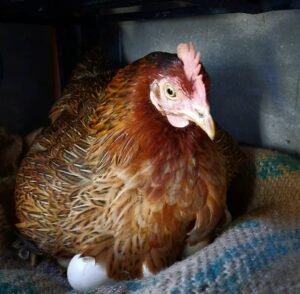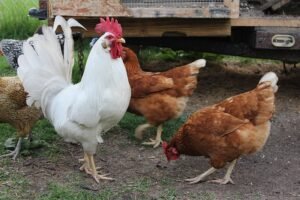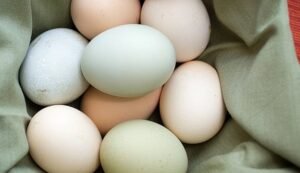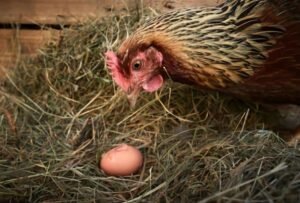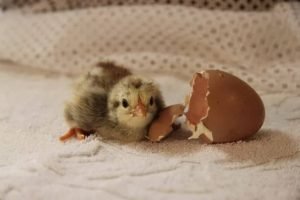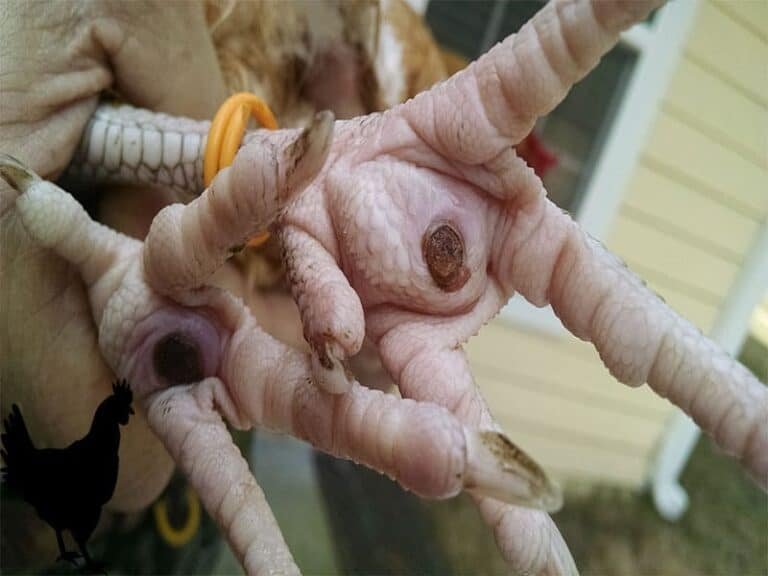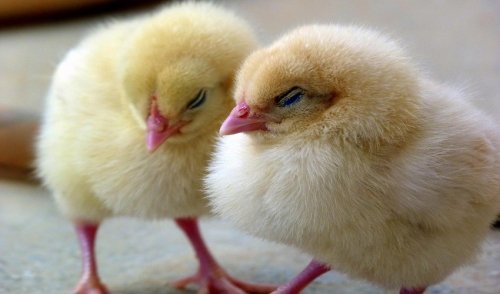10 Sure Ways To Stop Chickens from Eating Their Eggs [+Bonus]
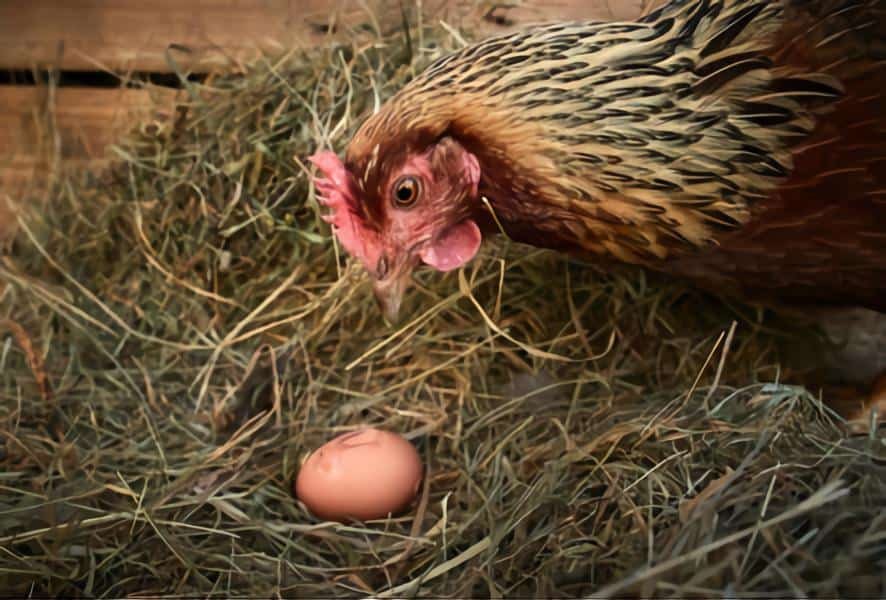
If your chickens are constantly breaking and eating their eggs, then I guess you have a huge problem to solve.
I know how heartbreaking it can be to find quite a number of broken eggs in your chicken nesting boxes when you check their coops.
For all I know, nobody likes the fact that their chickens are breaking and eating their eggs.
So, if you are tired of your Chickens breaking and eating their eggs then stick with this article and finish reading to the end.
In this article, you’ll find all you need to know about why chickens break and eat their eggs and smart easy ways to stop them.
Now, let’s begin…
You may also like to read about the 16 Myths About Fertilized Chicken Eggs That You Already Believed.
Why are my chickens breaking and eating their eggs?
Picture this…
Accidentally or maybe not, one of your chickens tasted an egg and saw how delicious it was.
It will definitely come back for more and even start breaking eggs in the nesting boxes.
Just to satisfy itself with this great new delicious taste it has found.
In a couple of days, she would tell her friends about the new, sweet discovery.
And gradually, this behavior becomes something the chickens get used to.
That’s why these habits should not be ignored on your poultry farm!
What causes chicken eggs to break on the farm?
Eggs laid can break due to various reasons like
1. Overcrowding the nesting box:
Not enough space for your laying birds can lead to clumsiness in the nesting area.
Birds in crowded nests tend to step on eggs and break them.
2. Inadequate nesting area cushion and bedding:
Eggs break when nesting materials and bedding like wood shavings rice bran, husk, etc. is not enough or well placed in a nesting box.
Eggs laid in such a place have the tendency to break easily as they reach the hard ground.
Hens laying eggs always do so in a squatting position and their eggs will fall through a small height.
Hence, the eggs need well-laid bedding to land to avoid cracking or breaking.
And remember, broken eggs around the coop beckon your chickens to egg-eating habits.
Also read about the 6 Best Chicken Egg Incubators for Chicken Eggs and Other Birds.
3. Deficiency in the diet of laying hens:
Chickens feeding on their own eggs (cannibalism) is actually not so unnatural.
Rather, it is a wild instinct to survive at any cost and provide themselves with feeds with good sources of nutrients.
Even if it means breaking their own eggs to feed themselves.
When essential nutrients are missing in a chicken’s diet they tend to look for substitutes in their environment.
Thus, they might peck on eggs in search of a good and nutritious meal for themselves.
4. Pecking by birds out of boredom:
Chickens get easily bored that’s why they tend to wander and explore a lot whenever they have the chance to.
Since they are in confinement they will engage themselves with playing with other chickens, bullying, feather plucking, and also egg eating.
When your hens are bored in the coop and around the nesting area they might decide to peck at eggs.

Why is it necessary to stop chickens from breaking and eating their eggs?
If I would be totally honest with you, this is a bad habit from your chickens that needs to stop as quickly as possible.
That’s because as the chickens continue to practice this habit on your poultry farm, it becomes harder to do away with it.
Chickens are omnivores that develop a taste for what they eat and can get used to the habit of feeding on their own eggs quickly.
Just one broken egg may be all it takes for your chickens to develop a taste for eggs.
Therefore, you cannot afford not to teach the right habits to your chickens, especially in areas like this.
Read this article next to learn How to Hatch Chicken Eggs Step by Step.
How do you find out which chicken is eating eggs?
You can simply figure out which of your chickens are up to no good and always eat the laid eggs by being very vigilant.
Finding them is the easy part, stopping them is where the work lies.
Being vigilant and keeping an eye on the chickens will make you spot the ones breaking and eating the eggs amongst your flock.
Also, you can easily tell which of your birds has been naughty and eating the eggs by checking their beak colors.
You will notice the yellow colors of dried yolks on the beaks of hens that eat eggs.
How To Stop Chickens From Breaking And Eating Their Eggs
A broken egg to chickens is like a clear invitation to eat and enjoy raw egg meals.
So, the first thing is to avoid egg breakage at all costs.
This will technically even prevent the eating of eggs by your birds in the first place, rather than looking for solutions.
Quite sure we all know the saying “prevention is better than cure.”
If your birds have picked up the bad habits of peaking and eating their own eggs, then here are sure ways to quickly check and stop them.
1. Provide your birds with proper and sufficient feeds with enough required nutrients:
Your chickens eating eggs can be a result of a deficiency in the diet you have been providing for them.
Eggs contain high-quality protein and the eggshell is almost made up of calcium.
That’s why your hens will take pleasure in feasting on them when these two essential nutrients are not enough in their feed.
Therefore, be sure to promote protein and calcium in their feed and see if any changes take place.
Egg-laying hens need a lot of calcium in their body not only for egg formation but also, to maintain good and healthy bones.
Also, insufficient intake of calcium in your birds makes them lay thin-shelled or soft-shelled eggs.
These types of eggs are more prone to cracking and breaking in the nesting place when they are laid or stepped on.
You may want to learn about How to Make The Best Organic Chicken Feed For Your Farm.
2. Always make sure their nesting area is well cushioned to avoid breakage of eggs while laying:
As said earlier, a nesting box not well padded could cause eggs laid there to crack and break.
Your nesting materials must be enough and well spread around the boxes to provide a soft landing for the eggs.
3. Avoid overcrowding in the nesting area:
Such should not even be allowed on the farm at all.
Your chickens must be given enough space, especially in a deep litter housing system.
Otherwise, they start mischievous habits like bullying, feather plucking, pecking each other, food guarding, and eating eggs.
Provide at least 4 square feet of space for each hen in the coop.
Also, provide various spacious nesting boxes around the farm to accommodate laying birds easily.

4. Collect eggs as often as possible:
This action when kept on a farm schedule and when diligently done will help save quite a number of your eggs.
Remember, your chickens eating your eggs will only peck at eggs they find available in the coop.
When you cultivate the habit of picking your eggs regularly on a daily basis then the number of broken eggs due to various reasons will reduce very much.
Hens will lay all day as long as they have the right diet and good lighting around them.
Good lighting on your poultry farm and a cool environment improve egg productivity greatly.
Hens are known to lay the most from morning until about 12 noon.
This means that you won’t see much egg around any other time.
If you are chanced, you can even pick eggs every hour of the day just to make sure your chickens don’t break them.
At least, try to pick your eggs 5 times a day if you are handpicking your eggs from the nest boxes.
Read also: When Do Chickens Start Laying Eggs Regularly?
5. Use of decoy eggs like plastic eggs, golfs, and similar methods to trick birds to stop pecking:
In cases where your birds have already gotten so used to the bad habits of breaking and eating eggs, using a decoy can help.
The use of decoy eggs can be encouraged in your nesting boxes to confuse egg-eating chickens.
Wooden eggs, plastic eggs, rubber eggs, and even golf balls are very good materials that can serve such purposes.
These decoys are placed in the nesting boxes for the naughty chickens to peck at and try and break.
Only this time, the birds will be pecking wood, plastic, and/or rubber.
And after several attempts they get bored of it and gradually begin to loosen up, giving up their habit with time.
6. Placing repelling egg mixture in the nesting area:
This is another very effective way to stop birds from eating their eggs.
It involves filling up partially broken eggs with substances chickens dislike so much.
For example, you can fill empty shells with English mustard which looks yellowish just like the yoke, and are very much disliked by chickens.
Another is empty eggs filled with yellowish liquid soap.
A taste of this is enough to put them off completely and even if they return to it out of habit it surely won’t take long before they drop the habit.
Decoys like this are great for breaking the egg-eating habits of birds.
Also, read about How Many Eggs Does A Chicken Lay In A Week?
7. Separate the egg-eating layers from the others:
With the simple ways explained before on how to know which of the hens in your flock is eating your eggs.
You can easily identify them and quickly as soon as you notice such a habit you remove them from the flock.
Place them in another confinement preferably still within the coop but separated from the other laying birds.
Although, doing this will stop the egg-eating one from teaching the rest of the flock such an act.
Remember to pick the eggs of the egg-eating hens first so that they don’t eat them in the new confinements too.
A small spacious cage in the coop will do, the separated hens can still see the flock but they cannot go around with them.
Therefore, they are unable to show their friends their new habits.
More importantly, they would have also lost rank in their pecking order and familiarity within the coop.
When you put them back with the flock after a while, they focus more on their rank in the pecking order rather than pecking and eating laid eggs.
8. The use of roll-away nest boxes:
This method operates without much external control or intervention from you.
As long as you get very good and well-designed rollaway nest boxes your number of broken eggs will become almost zero.
This is because immediately when your chickens lay their eggs they will roll to a collection point.
Hence, denying them any contact with the egg once laid.
This automated way gives you the chance to spend less time picking eggs and stop breaking eggs completely.
9. Dim or no lights around the nesting area:
If your birds are going to the nest boxes to eat the eggs then reduce the light around the nest by adding curtains.
Installing nest box curtains is one of the most effective measures to combat egg eating and breaking.
Chickens have a hard time seeing in the dark and so the curtain will reduce the light greatly.
Which makes your birds lose interest in going there aside to lay eggs.
Besides, you must have noticed that chickens are afraid of the dark.
Therefore, they are much less likely to peck and eat eggs they can even hardly see.
10. Culling:
If you’ve tried all you can on all of these tips and still your birds are not yielding then you can Cull them.
You might have some persistent chickens that aren’t ready to give up their habits even though you have used various preventive measures.
These stubborn birds are so used to the bad habit and they seem to not want to drop it.
Then, you can select such a bird and remove it completely from the flock.
This helps you get rid of the persistent egg-eating birds from the flock and curb the spread.
Don’t fail to also read about these 10 Common Chicken Sounds and (How to Understand Them).
Conclusion
Chickens are lovely birds to have around your house and farm.
Remember also that if you are keeping your chickens for their eggs then you must be ready to take care of their needs in that regard.
Layers need a very good amount of protein and calcium in their diets to survive well and be productive.
Sometimes, your chickens can source them from broken eggs and the yolk they have found in the nesting box.
So always make sure you take enough and necessary preventive measures to avoid breaking eggs around the nest.
References:
- 12 Best Chicken breeds for Eggs – chicken breeds for eggs
- When Do Chickens Start Laying Eggs Regularly?
- How Many Eggs Does A Chicken Lay In A Week?
- Fermenting chicken feed – The definitive guide
- 10 Sure Ways To Stop Chickens from Eating Their Eggs [+Bonus]
- 6 Best Chicken Egg Incubators for Chicken Eggs and Other Birds
